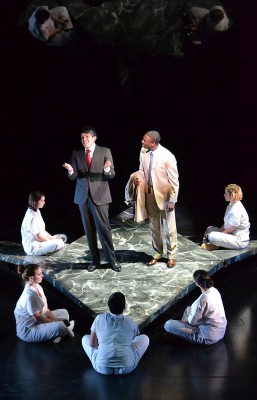
Everyone is aware of the eerie associations that come with a dream sequence involving an Orthodox rabbi from the Bronx bursting into opera, right? If not, this strange yet haunting sensation can be found in the opening scene of Peter Eötvös’s operatic adaptation of Tony Kushner’s play, “Angels in America.”
Boston University’s College of Fine Arts performed “Angels in America” on Friday night, shedding light on the taboo subjects of the ‘80s and interweaving the story lines of a drug addict, a closeted homosexual and the growing AIDS epidemic during the administration of former U.S. President Ronald Reagan.
It seems there must be something banal about referring to a performance like this as “dramatic.” It’s overused. It’s like saying “The Grand Budapest Hotel” was an “aesthetically-pleasing” film or referring to a teacup poodle as “cute.” But how else can one refer to a performance that features a doctor belching out “You have AIDS!” to business tycoon Roy Cohn, all while an orchestra plays jarring, ghostly sounds?
Divided into the play’s two parts, “Millennium Approaches” and “Perestroika,” the Eötvös opera is an expressive, imaginative rendition of Tony Kushner’s original. Like Kushner’s play, this adaption at the BU Theatre broke the fourth wall, quite literally. A mirror-like wall, hovering over the stage reflected the orchestra pit as the conductor moved his baton and string instruments exuded dissonant and even screeching sounds.
Props were minimally incorporated, primarily featuring a marble pedestal that rose and fell depending on each scene. It may have been a smart move for an operatic adaptation, where the focus is so heavily placed on vocals. Instead of working to make everything seem “real” on stage, the performance almost had the audience in a raw, “behind-the-scenes” atmosphere.
Six adult “children” swathed in what appeared to be white nurse uniforms, standing in perfect symmetry or grunting, chanting, stomping and growling in the background of each scene, serving as an interactive backdrop.
It was an avant-garde display, a performance one may not immediately associate with a traditional opera. Then again, illustrating the New York AIDS epidemic through opera is not very traditional to begin with, especially as told through multiple storylines. Harper Pitt, the Xanax-addicted Mormon is married to a closeted gay man, and Prior Walter has been diagnosed with AIDS, putting a terrible strain on his relationship with his partner Louis Ironson. Again, it’s dramatic.
The opera was a unique experience, then, integrating innovative methods in a traditional opera context. However, it didn’t seem to do Kushner’s plot complete justice. The nuances, connecting a diminishment of self-worth associated with heteronormativity were often lost in song. For a play that entwines various story lines, the plot development was not too well executed at times. However, condensing what was originally a two-part, six-hour play into a two-hour production is admittedly difficult — as must have been acting out each scene with uninterrupted singing.
It’s also fairly easy to see how this production could have been overwhelming or confusing to those who are not familiar with Kushner’s play or the 2003 HBO mini-series.
The second part of the performance, “Perestroika,” was often inconsistent, not fully developing or explaining the three main story lines, leaving too many loose threads that newcomers to the play shouldn’t have been expected to pick up.
However, what the play lacked in character and plot development, it made up for in many ways with evocative presentation. Ultimately, “Angels in America” was an aesthetically excellent performance.
The performance took an interesting approach that encapsulated much of the drama and mood associated with “Angels in America.” It may not appeal to a broad audience, but that is not necessarily a bad thing in the art world. This opera, while often divergent from the Broadway play’s approach, was a compelling interpretation. It featured a solid cast, excellent vocals and an ambiance that perfectly paralleled the passion of the play itself. Plus, who doesn’t love a little Yiddish accompanied with some baritone?





















































































































